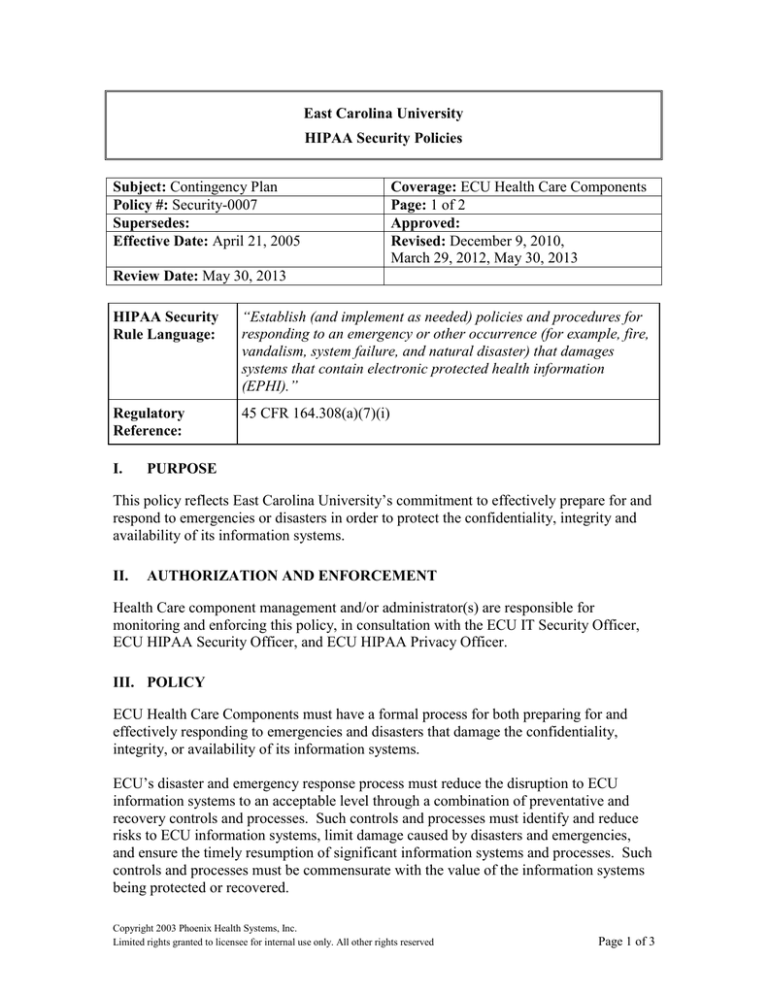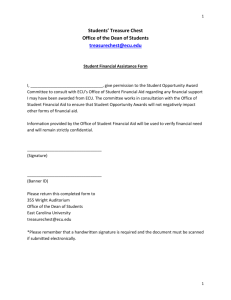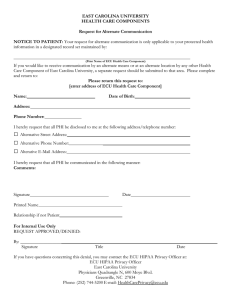
East Carolina University
HIPAA Security Policies
Subject: Contingency Plan
Policy #: Security-0007
Supersedes:
Effective Date: April 21, 2005
Coverage: ECU Health Care Components
Page: 1 of 2
Approved:
Revised: December 9, 2010,
March 29, 2012, May 30, 2013
Review Date: May 30, 2013
HIPAA Security
Rule Language:
“Establish (and implement as needed) policies and procedures for
responding to an emergency or other occurrence (for example, fire,
vandalism, system failure, and natural disaster) that damages
systems that contain electronic protected health information
(EPHI).”
Regulatory
Reference:
45 CFR 164.308(a)(7)(i)
I.
PURPOSE
This policy reflects East Carolina University’s commitment to effectively prepare for and
respond to emergencies or disasters in order to protect the confidentiality, integrity and
availability of its information systems.
II.
AUTHORIZATION AND ENFORCEMENT
Health Care component management and/or administrator(s) are responsible for
monitoring and enforcing this policy, in consultation with the ECU IT Security Officer,
ECU HIPAA Security Officer, and ECU HIPAA Privacy Officer.
III. POLICY
ECU Health Care Components must have a formal process for both preparing for and
effectively responding to emergencies and disasters that damage the confidentiality,
integrity, or availability of its information systems.
ECU’s disaster and emergency response process must reduce the disruption to ECU
information systems to an acceptable level through a combination of preventative and
recovery controls and processes. Such controls and processes must identify and reduce
risks to ECU information systems, limit damage caused by disasters and emergencies,
and ensure the timely resumption of significant information systems and processes. Such
controls and processes must be commensurate with the value of the information systems
being protected or recovered.
Copyright 2003 Phoenix Health Systems, Inc.
Limited rights granted to licensee for internal use only. All other rights reserved
Page 1 of 3
HIPAA Security Policy #0007: Contingency Plan
ECU workforce members must receive regular training and awareness on the university’s
disaster preparation and disaster and emergency response processes.
IV. APPLICABILITY
This policy is applicable to all workforce members who are responsible for or otherwise
administer a healthcare computing system. A healthcare computing system is defined as
a device or group of devices that store EPHI which is shared across the network and
accessed by healthcare workers.
V.
PROCEDURE
The following standards and safeguards must be implemented to satisfy the requirements
of this policy:
1. ECU Health Care Components must have a formal process for assuring all EPHI on
the University’s information systems and electronic media must be regularly backed up
and securely stored as specified in the Data Backup Standard.
2. ECU Health Care Components must create and document a Disaster Recovery Plan to
recover its information systems if they are impacted by a disaster as specified in the
Disaster Recovery Plan Standard.
3. ECU Health Care Components must have a formal, documented Emergency Mode
Operations plan to enable the continuance of crucial business processes that protect the
security of its information systems containing EPHI during and immediately after a crisis
situation as specified in the Emergency Mode Operations Plan Standard.
4. ECU Health Care Components must conduct regular testing of its Disaster Recovery
Plan to ensure that it is up to date and effective as specified in the Testing and Revision
Procedures Standard.
5. ECU Health Care Components must have a formal process for defining and
identifying the criticality of its information systems as specified in the Application and
Data Criticality Analysis Standard.
VI. COORDINATING INSTRUCTIONS
1. All section policies, standards and procedures will be reviewed annually. Every
section policy, standard and procedure revision/replacement will be maintained for a
minimum of six years from the date of its creation or when it was last in effect,
whichever is later. Other East Carolina University, University of North Carolina
system, or state of North Carolina requirements may stipulate a longer retention
period.
Copyright 2003 Phoenix Health Systems, Inc.
Limited rights granted to licensee for internal use only. All other rights reserved
Page 2 of 2




